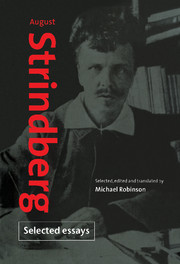Book contents
- Frontmatter
- Contents
- Notes on the text
- Introduction
- from Vivisections (1887)
- ‘The Battle of the Brains’
- ‘Nemesis Divina’
- ‘Mysticism – For Now’
- ‘Soul Murder (Apropos Rosmersholm)’
- ‘On Modern Drama and Modern Theatre’ (1889)
- from Vivisections II (1894)
- ‘Césarine’ (1894)
- ‘Deranged Sensations’ (1894)
- ‘In the Cemetery’ (1896)
- from Jardin des Plantes (1896)
- ‘On the Action of Light in Photography’ (1896)
- ‘A Glance into Space’ (1896)
- ‘Edvard Munch's Exhibition’ (1896)
- ‘The Synthesis of Gold’ (1896)
- ‘Contemporary Gold-Making’ (1896)
- ‘The Sunflower’ (1896)
- ‘The Mysticism of World History’ (1903)
- ‘August Strindberg on Himself’ (1909)
- Notes and commentary
- Index
‘The Battle of the Brains’
Published online by Cambridge University Press: 18 December 2009
- Frontmatter
- Contents
- Notes on the text
- Introduction
- from Vivisections (1887)
- ‘The Battle of the Brains’
- ‘Nemesis Divina’
- ‘Mysticism – For Now’
- ‘Soul Murder (Apropos Rosmersholm)’
- ‘On Modern Drama and Modern Theatre’ (1889)
- from Vivisections II (1894)
- ‘Césarine’ (1894)
- ‘Deranged Sensations’ (1894)
- ‘In the Cemetery’ (1896)
- from Jardin des Plantes (1896)
- ‘On the Action of Light in Photography’ (1896)
- ‘A Glance into Space’ (1896)
- ‘Edvard Munch's Exhibition’ (1896)
- ‘The Synthesis of Gold’ (1896)
- ‘Contemporary Gold-Making’ (1896)
- ‘The Sunflower’ (1896)
- ‘The Mysticism of World History’ (1903)
- ‘August Strindberg on Himself’ (1909)
- Notes and commentary
- Index
Summary
Doctor Charcot accepts the possibility of suggestion only where hypnotised hysterics are concerned; Doctor Bernheim goes somewhat further and grants that anyone who can be hypnotised is susceptible to ideas from without. But the latter, on the other hand, still finds that not everyone is equally receptive, and that one group of people is more receptive than another. Among these he numbers the lower classes, those with an aptitude for learning, old soldiers, artisans, in short, all those whose brains are at a lower stage of development or who are accustomed to subordinating themselves to someone else's will. Although no expert or authority on the ubject my experiments have led me to conclude that suggestion is only the stronger brain's struggle with, and victory over, a weaker mind, and that this procedure is applied unconsciously in daily life. It is the mind of the politician, thinker and author which sets other people's minds in automatic motion. The actor hypnotises his wide-awake public, forcing it to applaud, weep and laugh; the painter is a magician who can convince the viewer that he sees a landscape where there is nothing but colour on a canvas; the orator can make the masses believe .any kind of nonsense if he is a gifted speaker and has a command of rhetoric; and what cannot a priest in full canonicals achieve with all the appurtenances of ecclesiastical magnificence?
- Type
- Chapter
- Information
- August Strindberg: Selected Essays , pp. 25 - 46Publisher: Cambridge University PressPrint publication year: 1996



